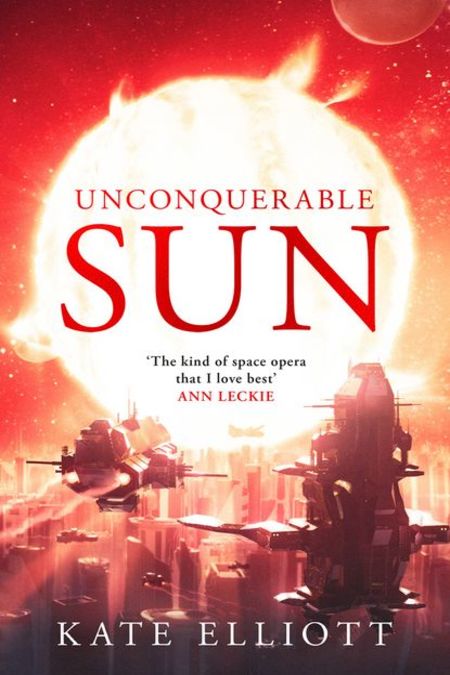There is something gloriously, wondrously good about having a space opera take you racing across the heavens in heady pursuit of power, fame, treasures or other eg-burnishing existential bauble.
It is even better when said space opera is superbly written with tightly intricate plotting, well thought-out and realised characters and an appreciation for the contrary foibles of human nature, something that Unconquerable Sun (#1 The Sun Chronicles) by Kate Elliott has in pleasing abundance.
This is space opera done absolutely, brilliantly, thrillingly right.
Set at an indeterminate point in the future when humanity has built and lost a sprawling civilisation known as the Celestial Empire, and has now settled in a string of solar systems linked by beacons which allow instantaneous travel over vast distances, Unconquerable Sun is, as much as it is anything, a fearsomely good piece of world-building.
In this brave new world of alliances and shifting power plays, the upstart but supremely successful Republic of Chaonia, ruled by the equal parts feared and feared Queen-Marshall Eirene, has worked hard to assert its right to exist against the preeminent power of the expansive Phene Empire and the Yele League, both of whom regard the creeping advance of their hitherto inconsequential neighbour as something to be stamped out like you would squash a cockroach underfoot.
With the series billed as a “gender-spun Alexander the Great”, who famously, or infamously, depending on your historical vantage point, took over much of the known world around the 330s BC through brilliantly strategised military campaigns, Unconquerable Sun is a breathtakingly evocation of what future humanity might achieve.
“‘You’re impatient. I understand that. You have a hundred reasons why you should be racing out to the battlefront instead of following the queen-marshall’s orders.’
‘I’ve earned a chance to be given a command on the front lines!’
‘We obey the queen-marshall, princess. That’s my duty, and that’s your duty. One day, if you pass the test that is your training for rulership, you’ll be the queen-marshall whose orders people obey. But that day is not today …'” (P. 35)
One sage lesson that becomes immediately apparent is that humanity not changed much in the millennia that led to the settlement and building up of these great civilisational entities.
For all of the gleaming spaceships and instant-travel beacons (which are the extant technological fruit of a fallen civilisation known as the Aspraras Convergence and thus not to humanity’s credit at all) of these groupings, people are still very much defined by powerplays, political intrigue and messy, violent squabbles for money and influence.
Bigotry and paranoia remain rife, and so while you can “ooh” and “aah” at the dazzling wonder of worlds wreathed in technological prowess and stunning advancement of Chaonia and its enemies, you are also brought narratively back to earth, and winningly so at every turn, by a sobering realisation that the same old impulses rule supreme.
This, naturally enough, make sense and delivers engaging storytelling that places Eirene’s heir, a half-human, half-Gatoi (a race of space dwelling warrior humans with a militaristic society and manically augmented bodies) named Sun (hence the title) as the Alexander the Great of the tale.
In this first volume – volume 2, Future Heaven and volume 3, Lady Chaos beckon over the next couple of years – Sun has just returned from a major victory at Na Iri, grabbing control of the valuable beacons there and also dealing another blow to the Phene Empire who are none too pleased to be losing ground to a chaotic wannabe power.
She is clearly on the up-and-up but that doesn’t guarantee that she is going to be allowed to fulfill her destiny untroubled and without a thousand enemies massing at her flanks.
In 500 or so vivaciously engaging pages, that uphold a rewarding balance between action and introspection, powerplays and relational machinations, Sun not only has to prove she is worthy of succeeding Eirene – though there are those who would ensure she never does and part of the narrative deals their shadowy geopolitical puppetry – but learn to rely upon her Companions (and their companions, known as companion companions or cee-cees) and forge relationships with them that respect her power but which also recognise that she must be close to them and trust them as friends and equals of a sort if she is to make a lasting mark of her own on Chaonia.
Thus Unconquerable Sun is as much about salutary lessons in the use and abuse of power, and in even the most advanced of societies can have an unjust and unfair underbelly, as it is about the very act of being human, with all its attendant successes and failures.
What emerges is that while Sun is an undoubtedly inspired strategist with a gift for seeing what needs to be done and then doing near flawlessly, she must also learn more about her people, both those dwelling in a host of solar systems but also those nearest and dearest to her, including Hetty, her closest companion and possible lover (this is against protocol but you soon learn Sun has little appetite for indulging protocol for protocol’s sake), Persephone, the heir to one of the seven aristocratic houses upon which the power of the Queen-Marshall depends, and others who, for a host of reasons and circumstances, are in her prestigious orbit.
“Solomon finds cover behind a workbench with a better angle on the side door. He catches my eye from all the way down the space and signals me to advance. A spiky voice worms into my head: What if he’s still working for my family? What if they’ve told him to kill me by any means necessary? What if he means to lure me out so the Phene can shoot me?
‘Can I trust him? It’s time to choose.'” (P. 302)
Unconquerable Sun then is the story, at heart, of a great and mighty leader in the making, one who is learning as many lessons about humanity in all its forms as she is about military success and soaring power.
The great success of Kate Elliott, the nom de plume of American fantasy and science fiction writer Alis A. Rasmussen, is that she skillfully weaves together daring, bold, scintillating action and intrigue with some soberingly ruminative explorations of what it means to be human.
It all results in a wholly satisfying space opera that deliver all the expansiveness and majestically impressive storytelling you could ask for, but which always keep focused on the innate humanity that forms the core of the story.
Humanity may not have changed much in millennia but that doesn’t mean one person cannot and it is exciting to see where Sun, who learns valuable and sage lessons even as she exercises her strategic brilliance time and again, might go and how she might come to shape not only her own society and those around it but the people close to her, all of whom will have a part to play in who she becomes and the form her inevitably glowing destiny takes.

